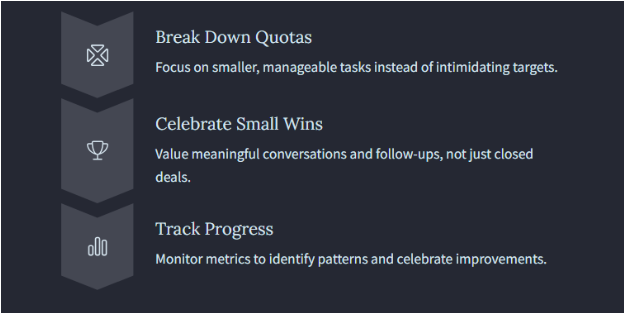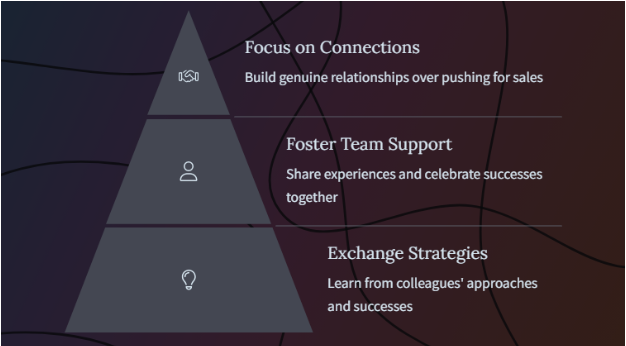How to Handle Cold Calling & Rejection Without Burning Out

How Pressure to Perform Amplifies Stress
The modern sales environment is highly competitive, with strict quotas and performance metrics constantly in view. The pressure to hit targets and produce measurable results adds another layer of stress. Salespeople often feel as if they are under a microscope, where every call is not just a potential sale but a test of their worth as a professional. This constant pressure makes it challenging to maintain a relaxed and positive attitude during each call.
Cold calling is often portrayed as a numbers game, but the reality is that it takes a significant emotional toll. Constant rejection, high-pressure targets, and the need to remain upbeat day after day can quickly lead to burnout. In this post, we explore why cold calling can be so draining, share practical strategies to maintain motivation, and offer insights from seasoned sales professionals on building a resilient mindset.
Why Is Cold Calling So Emotionally Draining?
What Makes Cold Calling a Unique Challenge in Sales?
The Psychological Toll of Constant Rejection
Every “no” can chip away at a salesperson’s self-confidence. When you’re on the phone day in and day out, hearing rejection repeatedly, it’s easy to begin questioning your abilities. This relentless cycle can lead to anxiety, self-doubt, and a diminished sense of self-worth. Over time, even the most confident salespeople may start to internalize these negative experiences, which can further impede performance.
How Does Rejection Affect Motivation and Confidence?
The Link Between Rejection and Burnout
Repeated rejection doesn’t just lower your spirits—it can sap your energy, leaving you feeling emotionally and physically exhausted. Over time, the accumulation of “no’s” can lead to a form of burnout where even the idea of picking up the phone feels overwhelming. This burnout makes it difficult to muster the enthusiasm needed to engage with prospects, ultimately impacting your overall performance.
Common Emotional Traps Salespeople Face
Salespeople often fall into traps such as taking rejection personally or believing that every failed call is a reflection of their inadequacy. This mindset can spiral into a negative feedback loop, where each subsequent call feels even more daunting. Recognizing these traps is the first step in breaking the cycle and developing strategies to mitigate their effects.
What Strategies Can Help You Stay Motivated While Cold Calling?
How Can Setting Realistic Goals Make a Difference?
Breaking Down Your Daily Call Quotas
Rather than focusing solely on a large, intimidating target, break your daily goals into smaller, manageable tasks. This might mean setting a goal to complete a certain number of quality conversations rather than just a fixed number of calls. By celebrating these small wins, you create a series of positive reinforcement moments that build confidence over time.
Focusing on Small Wins Instead of Big Results
Sometimes, success isn’t measured solely in closed deals. Recognize the value of a meaningful conversation, a follow-up meeting, or even a constructive piece of feedback from a prospect. Each small win can serve as a building block toward larger successes, and keeping track of these moments can help maintain motivation during tougher times.
Should You Use Scripts to Build Confidence?
How to Personalize Scripts Without Sounding Robotic
While scripts provide structure, it’s important to adapt them to your natural speaking style. Use them as a guideline rather than a rigid framework. Personalizing your approach makes the conversation feel more genuine, helping to establish rapport with prospects and reduce the likelihood of sounding too mechanical.
The Role of Scripts in Reducing Rejection Anxiety
Scripts can also serve as a safety net, providing you with a clear pathway during challenging calls. When rejection looms, having a well-prepared script can help reduce anxiety by ensuring you always know what to say next. Over time, as your confidence grows, you may find that you rely less on the script and more on your ability to engage naturally.
How Does Tracking Your Progress Keep You on Track?
Tools for Monitoring Call Metrics and Improvements
Utilize CRM platforms and analytics tools to monitor your call performance. Keeping a record of key metrics—such as call duration, conversion rates, and follow-up success—can help you identify patterns and areas for improvement. This data not only highlights progress but also informs adjustments in strategy to optimize your efforts.
Celebrating Milestones to Boost Morale
Every achievement, no matter how small, deserves recognition. Whether it’s a successful conversion or simply reaching your daily quota, taking time to celebrate these milestones reinforces your progress and motivates you to continue pushing forward. This positive reinforcement can be the key to sustaining long-term motivation.
How Can You Develop a Resilient Mindset for Cold Calling?
What Role Does Positive Self-Talk Play in Overcoming Rejection?
Examples of Affirmations Used by Experienced Salespeople
Adopting a practice of positive self-talk can transform how you perceive rejection. Many seasoned sales professionals use affirmations such as “Every call is a new opportunity” or “I learn and grow with every interaction.” These positive statements help reframe rejection as a stepping stone rather than a setback.
Reframing Rejection as Part of the Process
Understanding that rejection is not personal but simply part of the sales process is crucial. Each “no” brings you closer to a “yes.” By reframing rejection in this light, you can maintain your confidence and keep your focus on the long-term goal rather than the immediate disappointment.
How Can Taking Breaks and Practicing Self-Care Reduce Burnout?
The Importance of Short Breaks Between Calls
Regular breaks are essential for recharging your mental and emotional batteries. Even short intervals away from the phone can help clear your mind, reduce stress, and prevent burnout. Use these breaks to step away from your workspace, take a walk, or simply relax and breathe.
Strategies for Relaxation and Stress Relief After Work
After a long day of cold calling, engaging in activities that promote relaxation can be incredibly beneficial. Whether it’s exercising, meditating, or spending time with loved ones, make self-care a priority. These activities help restore your energy and prepare you for the next day’s challenges.
What Can You Learn from Experienced Salespeople?
How Do Sales Veterans Deal with Rejection?
Anecdotes from Sales Experts Who’ve Faced Similar Challenges
Many sales veterans have stories of early career rejections that eventually paved the way for success. Their experiences demonstrate that persistence and learning from each interaction can lead to significant improvement. By studying these anecdotes, you can gain insight into effective coping mechanisms and resilience strategies.
Mindset Shifts That Helped Them Persevere
Successful sales professionals often credit their ability to shift their mindset—from viewing rejection as failure to seeing it as valuable feedback—as a key factor in their longevity. Embracing a growth mindset allows you to extract lessons from every call, making each experience a building block for future success.
What Advice Would Top Salespeople Give to Those Struggling?
Practical Tips for Staying Motivated
Top salespeople emphasize the importance of maintaining a balanced perspective. They recommend setting achievable goals, celebrating small victories, and continuously learning from each interaction. These practical tips can help you stay motivated, even on challenging days.
Lessons on Building Emotional Resilience
Building emotional resilience is as much about mental training as it is about professional development. Techniques such as mindfulness, regular self-reflection, and seeking feedback from mentors can help fortify your mindset against the inevitable challenges of cold calling.

How Can You Make Cold Calling a More Rewarding Experience?
How Does Focusing on Building Connections Over Sales Help?

Shifting Your Mindset from Selling to Helping
When you focus on building genuine connections rather than just pushing for a sale, the entire process becomes more fulfilling. Approaching each call with the intent to understand and help the prospect can transform the interaction into a mutually beneficial conversation. This shift in mindset not only reduces stress but also fosters long-term relationships.
The Long-Term Benefits of Authentic Engagement
Authentic engagement lays the groundwork for trust and loyalty, which are essential for sustained business relationships. By prioritizing meaningful conversations over immediate sales, you set the stage for future opportunities and repeat business, which can be far more rewarding in the long run.
How Can a Supportive Work Environment Make a Difference?
Building Team Morale Through Peer Support
A strong team environment can significantly alleviate the stress of cold calling. When sales teams share their experiences, offer encouragement, and celebrate each other’s successes, it creates a supportive atmosphere that buffers against individual setbacks. Peer support fosters a sense of camaraderie and collective resilience.
Sharing Wins and Strategies with Your Team
Regular team meetings and knowledge-sharing sessions can be invaluable. By discussing strategies, sharing personal stories of overcoming rejection, and learning from each other’s successes, you create an environment where everyone feels empowered. This collaborative approach not only improves individual performance but also builds a stronger, more united team.
Conclusion: Handling Rejection Without Losing Your Drive
Cold calling will always be a challenging aspect of sales, but it doesn’t have to lead to burnout. By understanding the emotional toll of rejection, setting realistic goals, leveraging positive self-talk, and building a supportive network, you can transform each “no” into an opportunity for growth. Embrace the journey of continuous improvement, and remember that every call brings you one step closer to success.
Have you found effective strategies for handling rejection in your cold calling efforts? Share your experiences and insights, or reach out to learn more about tailored strategies that can help you thrive in today’s competitive sales environment.`
